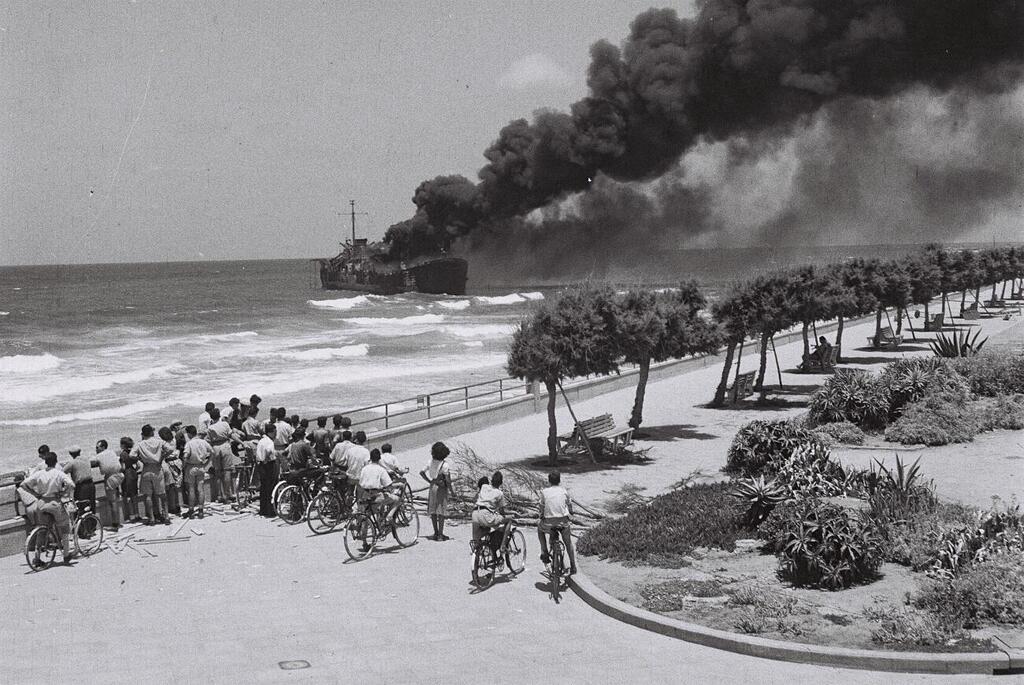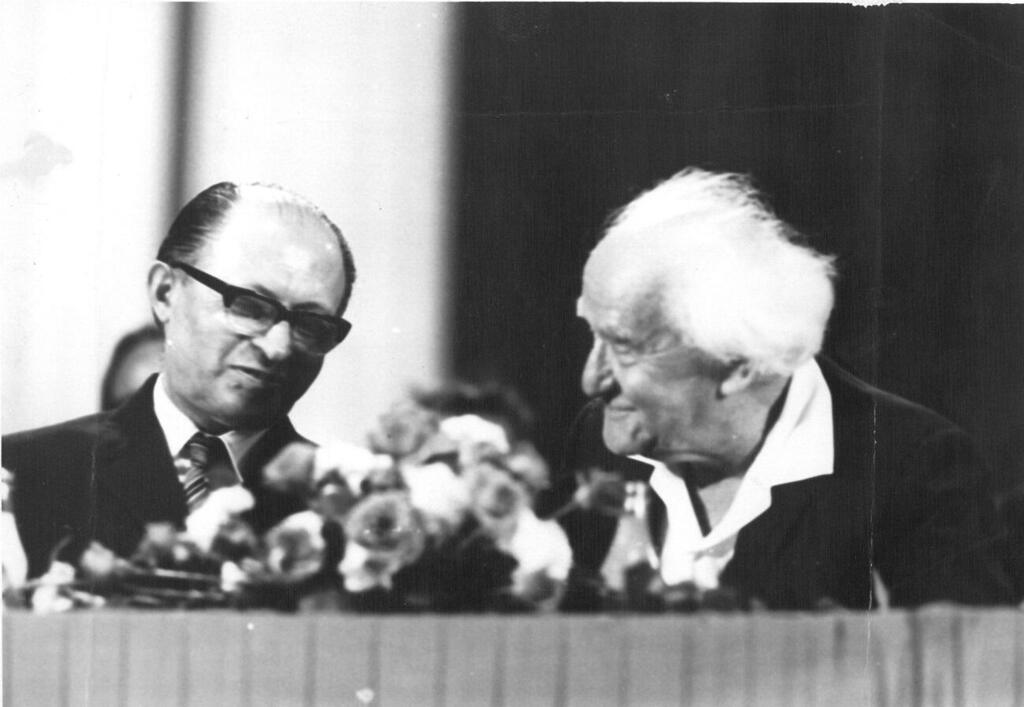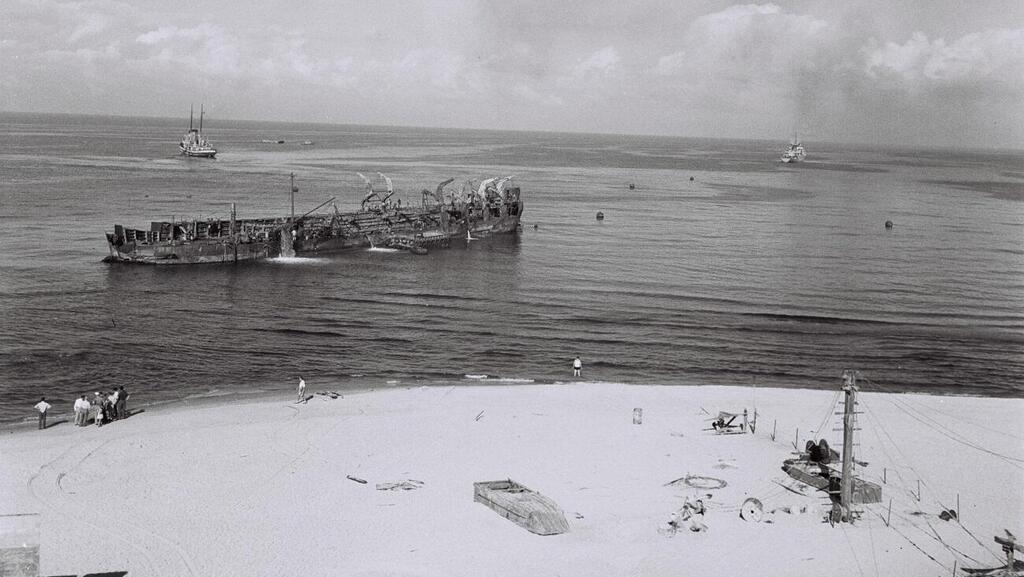Getting your Trinity Audio player ready...
In 1948, fighters of the Irgun Zionist paramilitary organization met the Israel Defense Forces in a battle that cost many casualties and led to the destruction and burning of the Altalena, a ship that remained off the beach of Tel Aviv for months as a reminder of the tragic event.
More stories:
The Altalena carried weapons, ammunition, medical supplies and nearly 1,000 immigrants from France to Israel in June 1948, arriving after Irgun members agreed to disband their forces and integrate into the nascent IDF.
Before anchoring in Kfar Vitkin, disagreements arose between Irgun members, led by Menachem Begin, and then-Prime Minister David Ben-Gurion and his associates. During the battle between the two sides, the ship escaped to the shores of Tel Aviv, where it was hit by a cannon shell and caught fire.
In the clashes, 16 Irgun fighters and three IDF soldiers were killed. The disabled Altalena remained off the coast of Tel Aviv for several months until Ben-Gurion ordered it to be sunk. For decades, attempts were made to locate the Altalena and salvage it from the water so that its remains could serve as a memorial to the fallen.
The ship holds great historical significance, as the Altalena can serve as a tangible reminder of the dangers that lurk when parts of the Israeli people are divided
The ship holds great historical significance, as the Altalena can serve as a tangible reminder of the dangers that lurk when parts of the Israeli people are divided, especially in recent times. However, despite its major importance, the state hasn’t contributed enough effort to locate it.
Roni Sadeh, currently the head of Israel’s Marine Mapping Division, has been involved in efforts to locate the Altalena for nearly 25 years. "Over the years, I have collected material from a variety of sources," he said.
"From old notebooks to journals in which fishermen marked interesting points on the seabed, such as a point to be cautious of to avoid tearing nets. For me, that was a clue. In addition, I maintained contact with companies that conducted sonar scans over the years, and I assembled a field team in sea areas where I thought there was some potential to find something," he said.
"Now we’re at the final stage, and need to lower cameras and verify if what I can see there is indeed the Altalena," Sadeh added. "The problem is that the item is at a depth of 300 meters -400 meters, which requires a specialized vessel to carry and operate an underwater robot. In the end, it all comes down to a budgetary issue."
In the past, Sadeh tried to raise funds from investors for the project without success. The government also got involved a few years ago during a venture initiated by Justice Minister Yariv Levin, who has a familial connection to the Altalena’s commander.
However, the allocated amount – around 250,000 shekels ($69,400) – transferred to the Menachem Begin Heritage Center wasn’t sufficient to complete to operation at the time. A ship with the ability to film in shallow waters failed to locate the remains, and for a more advanced vessel a larger sum of money would be necessary.
"Today, it's a sum that will be enough," Sadeh said. “We’re more focused than before. There’s no need to conduct extensive searches like in the past. It's natural for a country to undertake such a project. Currently, there are no searches taking place in the area.”
“I believe Israel should want the Altalena to be found,” he added. “It holds great importance despite being a politically charged topic. It's important to understand that what we couldn't do back then is now possible."
In 2019, additional searches were conducted by the Antiquities Authority. Koby Sharvit, head of the Antiquities Authority’s Underwater Archeology Unit, said that: "We began the recent searches from an internal budget and in collaboration with the University of Haifa’s Marine Technologies Department, using autonomous robotic tools to survey a suspected seabed area where the Altalena's wreckage might be based on our research and gathered information.”
"As a result, we contacted the Tourism Ministry to start fundraising for further searches. However, that's when the government was disbanded," Sharvit added.
"What we know for certain is that there’s a process of rusting and deterioration in iron, and some parts are corroded. It's reasonable to assume that some parts still remain, but time is working against us. This is part of Israel’s heritage, for better or worse."
Herzl Makov, head of the Menachem Begin Heritage Center, said that, "It’s appropriate and important for this chapter in Israel’s history to end, and Israel can allocate the budget to do so.”
“Unfortunately, this hasn't been done, but not because they don't want to find the Altalena. It comes from a neglect of the issue and the fact the topic isn’t on the agenda,” he added. “I believe we’ll resume working on this matter soon.”




